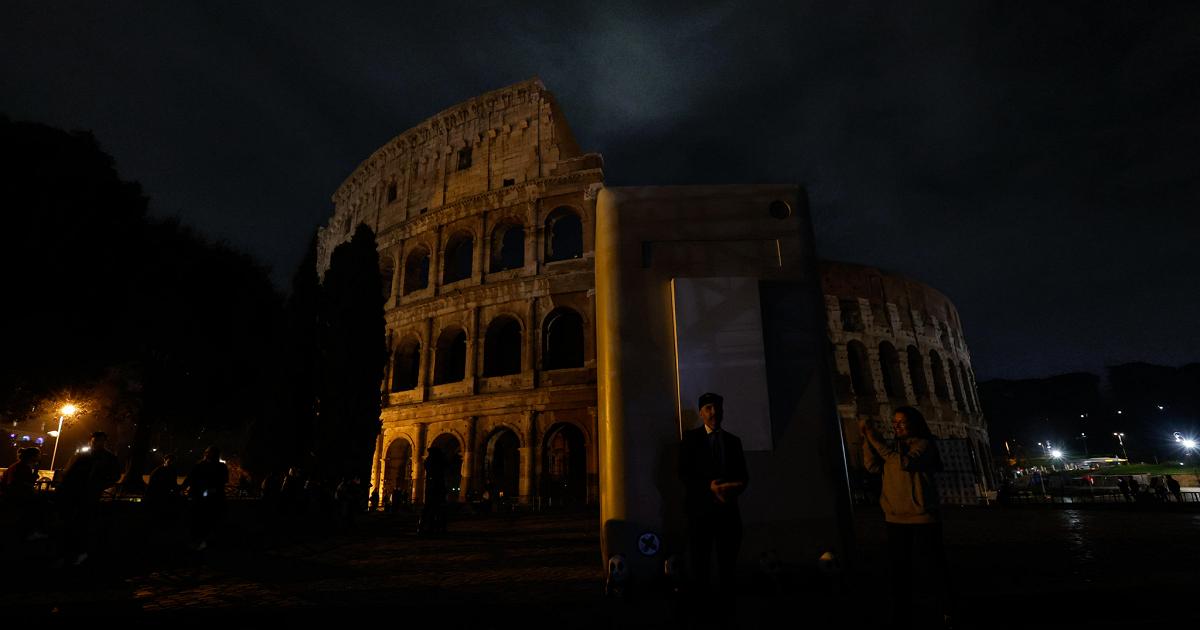Environment Climate change
WWF global event in 200 countries
Earth Hour 2023: the world shuts down against climate change
Earth Hour was not only an international mobilization but an invitation to join forces to act and have ''-CO2 and +Nature''
25/03/2023
On March 25 at 20.30, in about 200 countries and territories around the world, the Earth Hour, the WWF global event that for this 15th edition involved millions of people, along with thousands of cities, monuments and symbolic places. In Rome, Maccio Capatonda, in front of hundreds of people, turned off the Colosseum with his "super finger", and launched a message as simple as it is immediate: each of us can take small but large actions to help ensure a fairer and more sustainable future for all. In this case, dedicating 60 minutes to positive action for the future of our fragile planet.
Also this year Earth Hour was not only an international mobilization, but an invitation to join forces to act and have ''-Co2 and +Nature'' in the lives of all of us, every day. Earth Hour 2023 comes on the heels of the historic Kunming-Montreal agreement at COP15 which, in December 2022, saw the world commit to halting and reversing biodiversity loss by 2030. But it also comes just 5 days after the very serious alarm of the IPCC, the scientific panel on climate of the United Nations, which found that man-made climate change is already causing many extreme weather and climate phenomena in every region of the world, with widespread loss and damage to nature and people. Future changes can only be limited by a deep, rapid and sustained reduction in global greenhouse gas emissions.
"The next seven years are crucial to ensure that the decade ends with more Nature and biodiversity than the current one and to remain below the threshold of 1.5 ° C of global warming, avoiding irreversible damage to our planet and our lives - said Alessandra Prampolini, WWF Italy Director General - On the occasion of Earth Hour the WWF calls on institutions, Companies and citizens: science is showing us the way, the facts show us the urgency, it is no longer time for hesitation or hesitation. Let's close the era of fossil fuels and start a great climate change adaptation plan for our territory".
The external lights of the most important institutional buildings have been turned off: Palazzo del Quirinale (Presidency of the Republic), Palazzo Madama (Senate of the Republic), Palazzo Montecitorio (Chamber of Deputies), Palazzo Chigi (Presidency of the Council of Ministers) and St. Peter's Basilica. In Italy the arena of Verona, Piazza Pretoria in Palermo, Palazzo del Podestà in Bologna, Piazza San Marco in Venice, in Trento the Castello del Buonconsiglio and the Muse, in Florence the Duomo, Palazzo Vecchio, the Church of Santa Croce, Ponte Vecchio and the Statue of David in Piazzale Michelangelo, in Parma the town hall, in Trieste the main façade of the Town Hall, in Pistoia the loggia of the Town Hall, in Naples the façade of Palazzo San Giacomo, seat of the Town Hall and the Maschio Angioino, the Municipality in Potenza, Piazza Duomo in Catania (Palazzo degli Elefanti), Porta San Biagio in Lecce and in Abruzzo have joined the 3 national parks, the Torre del Cerrano Marine Protected Area, L'Aquila and the provincial capitals Chieti, Pescara and Teramo.
At the same time along the world's time zones, countries participated in the event with shutdowns and many initiatives, involving hundreds of influencers and local celebrities ready to show their support for ''The Biggest Hour for Earth''. Concerts (Latvia), sustainable fashion shows (WWF Mongolia), but above all concrete gestures for the planet: over 100,000 people from 167 countries declared their commitment to "reconnect" with nature, carry out actions to restore and clean up the environment, gain information and greater awareness about the climate crisis and inspire others to act for a sustainable future.

